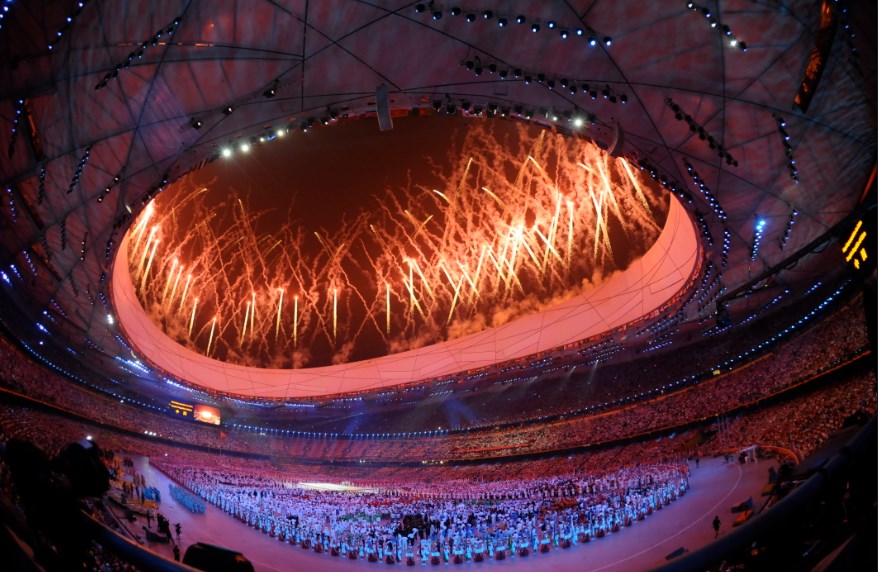On July 24, 2020, the Olympic torch will again be passed to Beijing, host of the 2022 Winter Olympics. In the decade since China first hosted the Games with promises of political opening and improved human rights, the already distressing political situation there has only deteriorated further.
It is no longer plausible to imagine the Games bringing change to China: it is instead time to use the coveted right to host the Games, one of the outside world’s few remaining levers on Beijing, to pressure China to change course.
The Olympic Games were first awarded to Beijing in the hope that the 2008 Games would encourage a more open China. Such hopes were not completely unfounded. The international spotlight on South Korea as the 1988 Seoul Games approached, for example, led the government there to yield to popular demands for constitutional reform.
Beijing even explicitly drew upon such hopes in promoting its bid, claiming that the Games would prompt advances in the fields of democratisation and human rights.

Nothing, however, could have been further from the truth. Beijing evicted millions in the run-up to the 2008 Games, reporters were prevented from doing their jobs, Potemkin-style “protest zones” were empty, and in response to real protests, the state oversaw a vicious crackdown on the Tibetan plateau and beyond.
The 2008 Olympics did not create a more open China. Rather, the Games taught the Party-state that it could maintain a closed political system, even backtracking on its promises of openness, yet still be embraced with open arms by the world.
Accordingly, since 2008, the already dreadful human rights situation in China has deteriorated precipitously.
Nowhere is this crisis more dire than in the nominally autonomous region of Xinjiang. Since 2017, the Han-controlled Chinese state has built a network of concentration camps in the region, currently holding between one and three million Uyghurs and other Turkic Muslims arbitrarily and indefinitely: implementing state terror in the name of “anti-terrorism.”

Prisoners are not detained for any criminal offence, but rather solely due to their ethnicity or religion. Grounds for detention in these camps include praying, fasting, growing a beard, wearing a hijab, attending mosque, and abstaining from alcohol or tobacco.
Inside the camps, guards pressure inmates to abandon religious beliefs and cultural practices, and to sing songs of praise for the Chinese Communist Party and its Chairman, Xi Jinping. Despite an official blackout on reporting, there are widespread allegations of food deprivation, sleep deprivation, torture, sexual abuse, forced medication, and forced sterilisation in the camps.

This is the most daunting human rights crisis facing the world today, and it demands a strong response. The least that the international community can do is to refuse to give Beijing yet another blank check to escalate repression and still host the 2022 Games.
No one today would openly endorse holding the Games in a state holding millions in concentration camps, but this is precisely what is happening at the moment. Should these games go forward as planned, the Chinese Communist Party will use the 2022 Olympics to boost its international image and domestic legitimacy.
We need to reverse this dynamic: rather than the CCP using the Games to legitimise itself, the international community needs to begin using the Games to pressure the CCP. This will require multiple layers of mobilisation, based in a broad consensus that concentration camps should have no place in the 21st century, or at the very least should not be rewarded with global mega-events.
To begin, concerned members of the general public should apply pressure on their national Olympic committees, politicians, and corporate Olympics sponsors. These intermediaries should, in turn, remind the International Olympic Committee that the PRC state’s policies in Xinjiang are a violation of multiple clauses of the Olympic Charter, not least the Charter’s emphasis on the “preservation of human dignity.”

The outcome of such pressures remains uncertain, but refusing to try is simply not an option. Should Beijing be willing to verifiably change its Uyghur policy before July 24, 2020, the opening date of the Tokyo Olympics, preparations for the Games should proceed.
If, however, Beijing remains recalcitrant, the International Olympic Committee and the global community must seek an alternate location for the 2022 Games. A delay to the Games resulting from a change in locations, while inconvenient, would still be preferable to having the Games used to rally support for a state engaged in crimes against humanity.
Finally, should the IOC and its sponsors continue to work with Beijing while it continues to hold millions arbitrarily, then governments, civil society organisations, athletes, and Olympic enthusiasts around the world will have no choice but to boycott the 2022 Games and its sponsors for complicity in these crimes.
Before we reach that point, however, everyone involved has a chance to change course. The only question is, will we? Our past complacency has sent Beijing the wrong message, but the extraordinary circumstances in which the Uyghur people find themselves today mean that business as usual is simply no longer an option.
Kevin Carrico has prepared a report for the Uyghur Human Rights Project on the Beijing 2020 campaign, available here.
